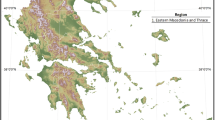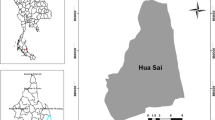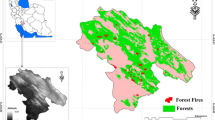Abstract
Forest fires are one of the major causes of ecological disturbance in the mediterranean climate ecosystems of the world. Despite the fact that a lot of resources have been invested in fire prevention and suppression, the number of fires occurring in the Mediterranean Basin in the recent decades has continued to markedly increase. The understanding of the relationship between landscape and fire lies, among others, in the identification of the system’s post-fire resilience. In our study, ecological and landscape data are integrated with decision-support techniques in a Geographic Information Systems (GIS) framework to evaluate the risk of losing post-fire resilience in Pinus halepensis forests, using Cape Sounion National Park, Central Greece, as a pilot case. The multi-criteria decision support approach has been used to synthesize both bio-indicators (woody cover, pine density, legume cover and relative species richness and annual colonizers) and geo-indicators (fire history, parent material, and slope inclination) in order to rank the landscape components. Judgments related to the significance of each factor were incorporated within the weights coefficients and then integrated into the multicriteria rule to map the risk index. Sensitivity analysis was very critical for assessing the contribution of each factor and the sensitivity to subjective weight judgments to the final output. The results of this study include a final ranking map of the risk of losing resilience, which is very useful in identifying the “risk hotspots”, where post-fire management measures should be applied in priority.




Similar content being viewed by others
References
Amiro B, MacPherson J, Desjardins R, Chen J, Liu J (2003) Post-fire carbon dioxide fluxes in the western Canadian boreal forest: evidence from towers, aircraft and remote sensing. Agricultural and Forest Meteorology 115:91–107
Anderson HE (1982) Aids to determining fuel models for estimating fire behaviour. General Technical Report INT-122, United States Department of Agriculture, Forest Service, Intermountain Forest and Range Experiment Station, Ogden, UT, p 26
Arianoutsou M (1998a) Aspects of demography in post-fire Mediterranean plant communities of Greece. In: Rundel PW, Montenegro G, Jaksic F (eds) Landscape degradation in mediterranean-type ecosystems, Ecological Studies 136. Springer, Berlin, pp 273–295
Arianoutsou M (1998b) Fire’s effects on the ecosystem: the PROMETHEUS Project approach. In: Viegas DX (ed) Proceedings of the third International Conference on Forest Fire Research, Associacao para o Desenvolvimento da Aerodinamica Industrial, pp 1827–1841
Arianoutsou M (1999) Effects of fire on vegetation demography. In: CINAR (eds) Proceedings of the International Symposium on Forest Fires: needs and innovations, Athens, pp 265–273
Arianoutsou M (2001) Landscape changes in mediterranean ecosystems of Greece: implications for fire and biodiversity issues. Journal of Mediterranean Ecology 2:165–178
Arianoutsou M (2004) Predicting the post-fire regeneration and resilience of Mediterranean plant communities. In: Arianoutsou M, Papanastasis VP (eds) Ecology, Conservation and Management of Mediterranean Climate Ecosystems of the World. Proceedings of the MEDECOS 10th International Conference, Rhodes, Greece. Millpress, Rotterdam, Electronic Edition
Arianoutsou M (2007) Resilience of Mediterranean vegetation to fire: Issues under the global change scenarios. In: Rokich D, Wardell-Johnson G, Yates C, Stevens J, Dixon K, McLellan R, Moss G (eds) Proceedings of the XI MEDECOS Conference, Kings Park and Botanic Garden, Australia, pp 5-7
Arianoutsou M, Ne’eman G (2000) Post-fire regeneration of natural Pinus halepensis forests in the East Mediterranean basin. In: Ne’eman G, Trabaud L (eds) Ecology, Biogeography and Management of Pinus halepensis and P. brutia forest ecosystems in the Mediterranean Basin. Backhuys Publishers, Leiden, pp 269–290
Αrianoutsou M, Kazanis D, Varela V (2000) Ecological indicators of land degradation due to frequent fires: the case of Penteli Mt., Attica, Greece. In: Book of Abstracts, MEDECOS 2000, Stellenbosch, South Africa, p 2
Arianoutsou M, Kazanis D, Kokkoris Y, Skourou P (2002) Land-use interactions with fire in Mediterranean Pinus halepensis landscapes of Greece: patterns of biodiversity. In: Viegas DX (ed) Proceedings of the IV International Conference on Forest Fire Research. Millpress, Rotterdam, Electronic edition
Arianoutsou M, Kazanis D, Varela V (2007) Mapping the post-fire regeneration of Mediterranean pine forests: the case of Sounion National Park. Options Méditerranéennes 75:25–33
Baeza M, Valdecantos A, Alloza J, Vallejo V (2007) Human disturbance and environmental factors as drivers of long-term post-fire regeneration patterns in Mediterranean forests. Journal of Vegetation Science 18:243–252
Barbero M, Loisel R, Quezel P, Richardson DM, Romane F (1998) Pines of the Mediterranean Basin. In: Richardson DM (ed) Ecology and Biogeography of Pinus. Cambridge University Press, Cambridge, pp 153–170
Bisson M, Fornaciai A, Coli A, Mazzarini F, Pareschi MT (2008) The vegetation resilience after fire (VRAF) index: development, implementation and an illustration from central Italy. International Journal of Applied Earth Observation and Geoinformation 10:312–329
Bond WJ, Woodward FI, Midgley GF (2005) The global distribution of ecosystems in a world without fire. The New Phytologist 165:525–538
Camia A, San-Miguel-Ayanz J, Kucera J, Amatulli G, Boca R, Libertà G, Durrant T, Schmuck G, Schulte E, Bucki M (2008) Forest fires in Europe 2007. Joint Research Centre, Institute for Environment and Sustainability, Office for Official Publications of the European Communities, Luxembourg, p 77
Canadell J, López-Soria L (1998) Lignotuber reserves support regrowth following clipping of two mediterranean shrubs. Functional Ecology 12:31–38
Clemente R, Cerrillo R, Gitas I (2009) Monitoring post-fire regeneration in Mediterranean ecosystems by employing multitemporal satellite imagery. International Journal of Wildland Fire 18:648–658
Conedera M, Mandallaz D, Bolognesi R, Ambrosetti P (1997) Forest fire research in Switzerland. Part 2: fire danger prediction in the southern part of Switzerland. International Forest Fire News 16:2–6
Corona P, Lamonaca A, Chirici G (2008) Remote sensing support for post fire forest management. iForest 1:6–12
Cowling RM, Rundel PW, Lamont BB, Arroyo M, Arianoutsou M (1996) Plant diversity in Mediterranean climate regions. Trends in Ecology and Evolution 11:362–366
Cowling RM, Ozeda F, Lamont BB, Rundel PW (2004) Climate stability in Mediterranean-type ecosystems: implications for the evolution and conservation of biodiversity. In: Arianoutsou M, Papanastasis VP (eds), Ecology, Conservation and Management of Mediterranean Climate Ecosystems of the World. Proceedings of the MEDECOS 10th International Conference, Rhodes, Greece. Millpress, Rotterdam, Electronic Edition
D’Antonio CM, Vitousek PM (1992) Biological invasions by exotic grasses, the grass/fire cycle, and global change. Annual Review of Ecology and Systematics 23:63–87
Daskalakou EN, Thanos CA (2004) Postfire regeneration of Aleppo pine—the temporal pattern of seedling recruitment. Plant Ecology 171:81–89
Dell B, Hopkins A, Lamont B (1986) Resilience in Mediterranean-type ecosystems. Dr W. Junk Publishers, Dordrecht, p 168
Díaz-Delgado R, Lloret F, Pons X, Terradas J (2002) Satellite evidence of decreasing resilience in mediterranean plant communities after recurrent wildfires. Ecology 83:2293–2303
Dimitrakopoulos AP (2001) PYROSTAT—a computer program for forest fire inventory and analysis in Mediterranean countries. Environmental Modelling Software 16:351–359
Evans RD, Rimer R, Sperry L, Belnap J (2001) Exotic plant invasion alters nitrogen dynamics in an arid grassland. Ecological Applications 11:1301–1310
Farina A (2000) Landscape ecology in action. Kluwer Academic Publishers, Dordrecht, p 317
Gunderson LA (2000) Ecological resilience in theory and application. Annual Review of Ecology and Systematics 31:425–439
Hernandez-Leal PA, Arbelo M, Gonzalez-Calvo A (2006) Fire risk assessment using satellite data. Advances in Space Research 37:741–746
Hobbs RJ, Mallik AU, Gimingham CH (1984) Studies on fire in Scottish heathland communities. III. Vital attributes of the species. Journal of Ecology 72:963–976
Holling CS (1973) Resilience and stability of ecological systems. Annual Review of Ecology and Systematics 4:1–23
Jaiswal RK, Saumitra M, Kumaran DR, Rajesh S (2002) Forest fire risk zone mapping from satellite imagery and GIS. International Journal of Applied Earth Observation and Geoinformation 4:1–10
Kazanis D (2005) Post-fire succession in Pinus halepensis forests of Greece. Patterns of vegetation dynamics. PhD Thesis, University of Athens (in Greek with an English summary)
Kazanis D, Arianoutsou M (1996) Vegetation composition in a post-fire successional gradient of Pinus halepensis forests in Attica, Greece. International Journal of Wildland Fire 6:83–91
Kazanis D, Arianoutsou M (2002) Long-term post-fire dynamics of Pinus halepensis forests of Central Greece: plant community patterns. In: Viegas DX (ed) Proceedings of the IV International Conference on Forest Fire Research. Millpress, Rotterdam, Electronic Edition
Kazanis D, Arianoutsou M (2004a) Long-term post-fire dynamics of Pinus halepensis forests of Central Greece: a functional group approach. Plant Ecology 171:101–121
Kazanis D, Arianoutsou M (2004b) Factors determining low Mediterranean ecosystems resilience to fire: the case of Pinus halepensis forests. In: Arianoutsou M, Papanastasis VP (eds) Ecology, Conservation and Management of Mediterranean Climate Ecosystems of the World. Proceedings of the MEDECOS 10th International Conference, Rhodes, Greece. Millpress, The Netherlands, Electronic Edition
Keramitsoglou I, Kiranoudis CT, Sarimveis H, Sifakis N (2004) A multidisciplinary decision support system for forest fire crisis management. Environmental Management 33(2):212–225
Kolassa J, Pickett STA (1991) Ecological heterogeneity. Springer, New York
Kutiel P (2000) Plant composition and plant species diversity in East Mediterranean Pinus halepensis forests. In: Ne’eman G, Trabaud L (eds) Ecology, Biogeography and Management of Pinus halepensis and Pinus brutia forest ecosystems in the Mediterranean Basin. Backhuys Publishers, Leiden, pp 143–152
Lambdon PW, Pyšek P, Basnou C, Hejda M, Arianoutsou M, Essl F, Jarošík V, Pergl J, Winter M, Anastasiu P, Andriopoulos P, Bazos I, Brundu G, Celesti-Grapow L, Chassot P, Delipetrou P, Josefsson M, Kark S, Klotz S, Kokkoris Y, Kühn I, Marchante H, Perglová I, Pino J, Vilà M, Zikos A, Roy D, Hulme PE (2008) Alien flora of Europe: species diversity, temporal trends, geographical patterns and research needs. Preslia 80:101–149
Lavorel S (1999) Ecological diversity and resilience of Mediterranean vegetation to disturbance. Diversity and Distributions 5:3–13
Legg C, Papanastasis VP, Heathfield D, Arianoutsou M, Kelly A, Muetzelfeldt R, Mazzoleni S (1998) Modelling the impact of grazing on vegetation in the Mediterranean: the approach of ModMED Project. In: Papanastasis VP (ed) Proceedings of the International Workshop on ‘Ecological basis of livestock grazing in the Mediterranean ecosystems’, European Commission, EUR 18308, Belgium, pp 189–200
Linkov I, Satterstrom F, Kiker G, Batchelor C, Bridges T, Ferguson E (2006) From comparative risk assessment to multi-criteria decision analysis and adaptive management: recent developments and applications. Environment International 32:1072–1093
Lloret F, López-Soria L (1993) Resprouting of Erica multiflora after experimental fire treatments. Journal of Vegetation Science 9:417–430
Lloret F, Vilà M (2003) Diversity patterns of plant functional types in relation to fire regime and previous land use in Mediterranean woodlands. Journal of Vegetation Science 14:387–398
Malczewski J (1999a) GIS and multicriteria decision analysis. Wiley, New York, p 392
Malczewski J (1999b) Spatial multicriteria decision analysis. In: Thill JC (ed) Spatial multicriteria decision making and analysis—a geographical information sciences approach. Ashgate, Brookfield, pp 11–48
Maselli F, Rodolfi A, Bottai L, Romanelli S, Conese C (2000) Classification of Mediterranean vegetation by TM and ancillary data for the evaluation of fire risk. International Journal of Remote Sensing 21:3303–3313
Mouillot F, Rambal S, Lavorel S (2001) A generic process-based SImulator for meditERRanean landscApes (SIERRA): design and validation exercises. Forest Ecology and Management 147:75–97
Mouillot F, Ratte JP, Joffre R, Moreno JM, Rambal S (2003) Some determinants of the spatio-temporal fire cycle in a mediterranean landscape (Corsica, France). Landscape Ecology 18:665–674
Nahal I (1981) The Mediterranean climate from a biological viewpoint. In: Di Castri F, Goodall DW, Specht RL (eds) Mediterranean-type shrublands. Elsevier Scientific Publishing Company, Amsterdam, pp 63–86
Oxley T, Winder N, McIntosh B, Mullingan M, Engelen G (2002) Integrated modelling and decision support tools: a Mediterranean example. Integrated assessment and decision support. In: Proceedings of the 1st Biennial Meeting of the International Environmental Modelling and Software Society, vol 1, Lugano, pp 120–125
Papavassiliou S, Arianoutsou M (1993) Regeneration of the leguminous herbaceous vegetation following fire in a Pinus halepensis forest of Attica, Greece. In: Trabaud L, Prodon R (eds) Fire in Mediterranean Ecosystems, Ecosystem Research Report no 5. Commission of the European Communities, Brussels, pp 119–126
Papavassiliou S, Arianoutsou M (1998) Flora, nodulation capacity and reproductive biology of Leguminosae in burned Pinus halepensis forests of Attica, Greece. In: Viegas DX (ed) Proceedings of the 3rd International Conference on Forest Fire Research, Luso, Portugal, pp 1587–1588
Pausas JG (2003) The effect of landscape pattern on Mediterranean vegetation dynamics—a modelling approach using functional types. Journal of Vegetation Science 14:365–374
Pausas JG, Ramos JI (2004) Landscape pattern, fire regime and vegetation dynamics—a modelling approach. In: Arianoutsou M, Papanastasis VP (eds) Ecology, Conservation and Management of Mediterranean Climate Ecosystems of the World. Proceedings of the MEDECOS 10th International Conference, Rhodes, Greece. Millpress, Rotterdam, Electronic Edition
Pausas JG, Ramos JI (2006) Landscape analysis and simulation shell (LASS). Environmental Modelling and Software 21:629–639
Pausas JG, Carbó E, Caturla RN, Gil JM, Vallejo R (1999) Post-fire regeneration patterns in the eastern Iberian Peninsula. Acta Oecologica 20:499–508
Pausas JG, Gimeno T, Vallejo R (2002) Fire severity and pine regeneration in the eastern Iberian Peninsula. In: Viegas DX (ed) Proceedings of the IV International Conference on Forest Fire Research. Millpress, Rotterdam, Electronic Edition
Pausas JG, Ribeiro E, Vallejo R (2004) Post-fire regeneration variability of Pinus halepensis in the eastern Iberian Peninsula. Forest Ecology and Management 203:251–259
Pausas JC, Llovet J, Rodrigo A, Vallejo R (2008) Are wildfires a disaster in the Mediterranean basin?—a review. International Journal of Wildland Fire 17:713–723
Philips A (1997) Landscape approaches to national parks and protected areas. In: Nelson GJ, Serafín R (eds) National parks and protected areas, NATO ASI Series G. ecological sciences, vol 40. Springer, Berlin, pp 31–42
Pivello VR, Countinho LM (1996) A qualitative successional model to assist in the management of Brazilian Cerrados. Forest Ecology and Management 87:127–138
Quezel P (2000) Taxonomy and biogeography of Mediterranean pines (Pinus halepensis and P. brutia). In: Ne’eman G, Trabaud L (eds) Ecology, Biogeography and Management of Pinus halepensis and Pinus brutia forest ecosystems in the Mediterranean Basin. Backhuys Publishers, Leiden, pp 1–12
Ricotta C, Avena GC, Olsen ER, Ramsey RD, Winn DS (1998) Monitoring the landscape stability of Mediterranean vegetation relation to fire with a fractal algorithm. International Journal of Remote Sensing 19:871–881
Roder A, Hill J, Duguy B, Alloza JA, Vallejo R (2008) Using long time series of landsat data to monitor fire events and post-fire dynamics and identify driving factors. A case study in the Ayora region (eastern Spain). Remote Sensing of Environment 112:259–273
Rollins MG, Keane RE, Parsons RA (2004) Mapping fuels and fire regimes using remote sensing, ecosystem simulation, and gradient modeling. Ecological Applications 14:75–95
Ruiz-Galardo RJ, Castaño S, Calera A (2004) Application of remote sensing and GIS to locate priority intervention areas after wildland fire in Mediterranean systems: a case study from south-eastern Spain. International Journal of Wildland Fire 13:241–252
Rundel PW (1981) Ecological success in relation to plant form and function in the woody legumes. In: Stirton CH, Zarucchi JL (eds) Advances in legume biology. Monographs in systematic botany. vol 29. Missouri Botanical Garden, Missouri, pp 377–398
Smith SM, Gawlik DE, Rutchey K, Crozier GE, Gray S (2003) Assessing drought-related ecological risk in the Florida Everglades. Journal of Environmental Management 68:355–366
Tàbara D, Saurí D, Cerdan R (2003) Forest fire risk management and public participation in changing socioenvironmental conditions: a case study in a Mediterranean region. Risk Analysis 23:241–260
Thon S, Remy E, Raffin R, Gesquière G (2007) Combining GIS and forest fire simulation in a virtual reality environment for environmental management. Architecture, City and Environment 2:741–748
Trabaud L (2000) Post-fire regeneration of natural Pinus halepensis forests in the west Mediterranean. In: Ne’eman G, Trabaud L (eds) Ecology, Biogeography and Management of Pinus halepensis and P. brutia forest ecosystems in the Mediterranean Basin. Backhuys Publishers, Leiden, pp 257–268
Trabaud L, Grosman J, Walter T (1985) Recovery of burnt Pinus halepensis Mill. forests. II. Understorey and litter phytomass development after wildfire. Forest Ecology and Management 12:269–277
Tsitsoni T (1997) Conditions determining natural regeneration after wildfires in the Pinus halepensis (Miller, 1768) forests of Kassandra Peninsula (North Greece). Forest Ecology and Management 92:199–208
Vadrevu KP, Eaturu A, Badarinath KVS (2010) Fire risk evaluation using multicriteria analysis—a case study. Environmental Monitoring and Assessment 166:223–239
Vafeidis AT, Drake NA (2005) A two-step method for estimating the extent of burnt areas with the use of coarse-resolution data. International Journal of Remote Sensing 26:2441–2459
Vafeidis AT, Drake N, Wainwright J (2007) A proposed method for modelling the hydrologic response of catchments to burning with the use of remote sensing and GIS. CATENA 70:396–409
Vakalis D, Sarimveis H, Kiranoudis CT, Alexandridis A, Bafas G (2004a) A GIS based operational system for wildland fire crisis management I. Mathematical modelling and simulation. Applied Mathematical Modelling 2:389–410
Vakalis D, Sarimveis H, Kiranoudis CT, Alexandridis A, Bafas G (2004b) A GIS based operational system for wildland fire crisis management II. System architecture and case studies. Applied Mathematical Modelling 28:411–425
Vasilakos C, Kalabokidis K, Hatzopoulos J, Kallos G, Matsinos Y (2007) Integrating new methods and tools in fire danger rating. International Journal of Wildland Fire 16:306–316
Vesk PA, Westoby M (2004) Sprouting by plants: the effects of modular organisms. Functional Ecology 18:939–945
Vilà M, Lloret F, Ogheri E, Terradas J (2001) Positive fire-grass feedback in Mediterranean Basin woodlands. Forest Ecology and Management 147:3–14
Westman W (1978) Measuring the inertia and resilience of ecological systems. BioScience 28:705–710
Zedler PH, Gautier CR, McMaster GS (1983) Vegetation change in response to extreme events: the effect of a short interval between fires in California chaparral and costal sage scrub. Ecology 64:809–818
Acknowledgments
Part of this work was funded by the EU project SPREAD (EVGI-CT2001-0043), which is gratefully acknowledged. Dr Penny Marinou (Litterae ®) is also acknowledged for her support in the linguistic improvement of the manuscript. The authors would like to thank the anonymous reviewers and the field editor for their comments on an earlier version of the manuscript.
Author information
Authors and Affiliations
Corresponding author
Rights and permissions
About this article
Cite this article
Arianoutsou, M., Koukoulas, S. & Kazanis, D. Evaluating Post-Fire Forest Resilience Using GIS and Multi-Criteria Analysis: An Example from Cape Sounion National Park, Greece. Environmental Management 47, 384–397 (2011). https://doi.org/10.1007/s00267-011-9614-7
Received:
Accepted:
Published:
Issue Date:
DOI: https://doi.org/10.1007/s00267-011-9614-7




